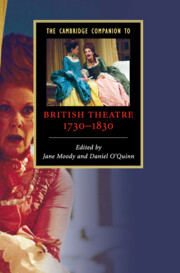17 - Reading theatre, 1730-1830
from Part V - Further Reading
Published online by Cambridge University Press: 28 May 2009
Summary
Over the past two decades, scholars of British theatre in the long eighteenth century have produced some of the most imaginative and exciting work in contemporary cultural studies. Just as radical changes in the nature and scale of Britain's print culture spurred theatre's growing importance as a public experience in this period, so in our own historical moment the changing exigencies of the academy have transformed how we think about the period's theatre. Divergent approaches to studying or even defining theatre have long hindered conversation between scholars in different disciplines. While twentieth-century theatre historians maintained an interest in acting styles, repertories and production techniques, literary scholars - inheriting a Romantic fascination with the lyric imagination - neglected theatre's 'claims of the body, the institution, and the market' (Moody 2000). As Jacky Bratton (2003) has argued, this theoretical and institutional divide cut off the study of theatre as literature from the study of theatre as performance. Because they relied on a critical apparatus which placed elite dramatic 'art' in opposition to popular theatrical 'entertainment', literary critics tended to overlook the myriad ways that text and acting, production and reception, authorship and spectatorship intersected in British theatre.
Influenced by new historicism and by the emergence of interdisciplinary approaches to cultural history, a new generation has addressed these oversights by exploring more fully the material, social and political conditions of theatrical production. Scholars in fields as diverse as art history, literary and performance studies, women's studies, economics, sociology and anthropology have contributed to a bold reassessment of how theatre shaped the social, political, cultural and institutional life of eighteenth- and nineteenth-century Britain. Concepts such as elite, popular, theatrical, performance, even Britishness itself have come under new kinds of scrutiny.
- Type
- Chapter
- Information
- The Cambridge Companion to British Theatre, 1730–1830 , pp. 249 - 260Publisher: Cambridge University PressPrint publication year: 2007

